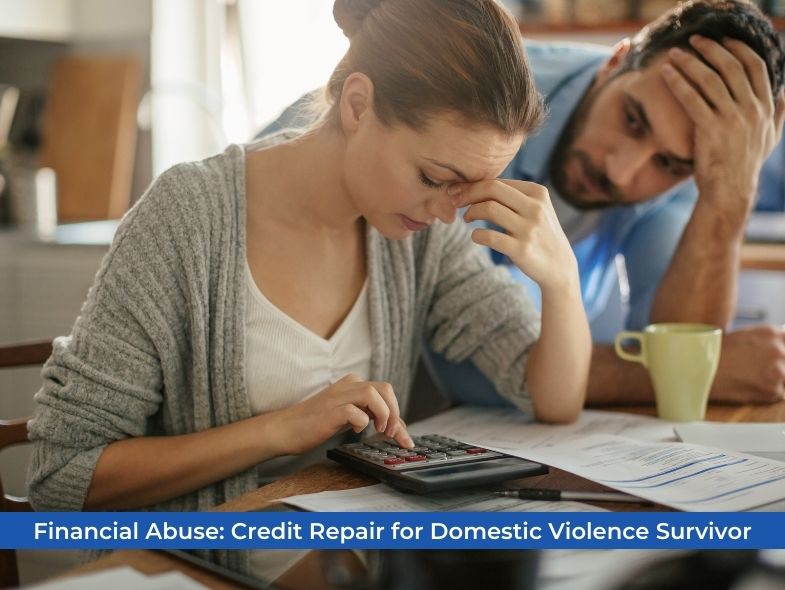Unfortunately, domestic abuse has been happening behind many doors. Many domestic violence survivors face different challenges to rebuild their lives. One of the significant hurdles they encounter is the impact on their credit. Financial abuse and Identity theft are the common challenges they face, leaving them with damaged credit scores and limited financial independence.
On this credit repair blog, we’ll be discussing the implications of financial abuse and identity theft, and explore the available resources to support credit recovery and foster independence.
Understanding Financial Abuse
Financial abuse is a form of control exerted by an abusive partner, which can have a negative impact on a survivor’s creditworthiness. The abuser may restrict the victim’s access to financial resources, ruin the victim’s credit by defaulting on loans, or accumulate debts in the victim’s name without their consent.
These actions can cause a lot of consequences on the survivor’s side. It can damage their credit and hinder their ability to secure housing, employment, and financial stability.
Impact of Identity Theft on Credit
Survivors of domestic abuse are particularly vulnerable to identity theft due to the close proximity of their abusers and the abundance of personal information accessible to them.
Abusers may misuse their partner’s personal information, open fraudulent accounts, or max out existing credit lines, leaving them with a damaged credit history. Recovering from identity theft can be challenging and time-consuming and requires a strategic approach.
Credit Repair Strategies for Survivors of Financial Abuse
• Document the Abuse
One crucial thing you must do as a survivor is document the abuse. Gather all the evidence of financial abuse and identity theft, including police reports, court orders, or documentation of fraudulent activities.
These documents will be useful when disputing information on your credit report later.
• Reporting Identity Theft
Reporting such cases is crucial. Canadian Anti-Fraud Centre is where you can file report and obtaining an Identity Theft Report can aid the credit repair process. You can also use this as evidence of fraudulent activities and help victims request the removal of fraudulent accounts from their credit reports.
• Reviewing and Disputing Credit Reports
You are entitled to a free credit report from major credit bureaus, Equifax and TransUnion. Take advantage of it to check your credit report regularly. Review it well and dispute inaccuracy resulting from financial abuse and identity theft.
Disputing these errors promptly can lead to their removal, improving the survivor’s credit score.
• Seeking Legal Assistance
Survivors may benefit from consulting legal professionals specializing in domestic violence and credit repair. These experts can provide guidance, help navigate the legal system, and ensure survivors’ rights are protected throughout the credit recovery process.
Resources for Credit Recovery and Independence
• Domestic Violence Support Organizations
For victims of domestic violence, organizations like shelters, helplines, and community centres provide helpful resources and support. They can provide guidance on credit repair and financial literacy and connect survivors with additional assistance.
• Credit Counselling Services
Non-profit credit counseling agencies offer guidance on debt management, budgeting, and credit repair strategies. These services can help survivors develop personalized plans to rebuild their credit and gain financial independence.
• Government Programs and Initiatives
The Canadian government provides various programs aimed at supporting survivors of domestic violence. These initiatives include financial assistance, housing support, and legal aid, which can contribute to credit recovery and overall well-being.
Empowering Financial Independence after Financial Abuse
• Employment and Career Support
Job training programs offer skills development and vocational training to enhance Employability. Resume building and interview preparation assistance help survivors present themselves effectively in job searches.
Workplace rights and protections ensure fair treatment and accommodations for survivors.
• Education and Scholarship Opportunities
Scholarships and grants specifically for survivors provide financial assistance for higher education. Financial aid programs and support services help survivors pursue educational goals. Academic support services offer counseling and accommodations to address academic challenges.
Financial Safety Planning
• Creating a Personalized Safety Plan
A safety plan is a personalized strategy that survivors can develop to protect themselves and their finances during and after leaving an abusive relationship. It involves assessing potential risks, identifying safe contacts, and establishing steps to ensure financial stability and security.
Survivors can work with domestic violence support organizations or financial counsellors to create a comprehensive safety plan tailored to their circumstances.
• Securing Financial Documents and Information
As a survivor, it is essential to safeguard important financial documents such as bank statements, identification documents, credit card statements, and insurance policies.
Consider obtaining physical copies and securing them in a safe location outside the home, such as a safe deposit or with a trusted friend or family member. Create encrypted backups on password-protected devices or secure cloud storage platforms for digital documents.
• Establishing Emergency Funds and Safety Nets
Building an emergency fund is essential for achieving financial security. You can start by regularly setting aside small amounts and gradually increasing the savings. Explore programs and resources that offer financial assistance to survivors, such as emergency grants or low-interest loans.
• Developing a Budget and Financial Plan
Creating a budget helps survivors manage their income, expenses, and debts effectively. Track monthly expenses, prioritize essential payments, and identify areas where expenses can be reduced.
Conclusion:
Survivors of domestic violence in Canada face credit repair challenges from financial abuse and identity theft. Remember, personalized guidance and support are crucial in this journey. Survivors can overcome challenges and reclaim control of their financial lives with resilience and the right resources.
Always seek help. In Credit Repair Now, we’ll be a helping hand.




